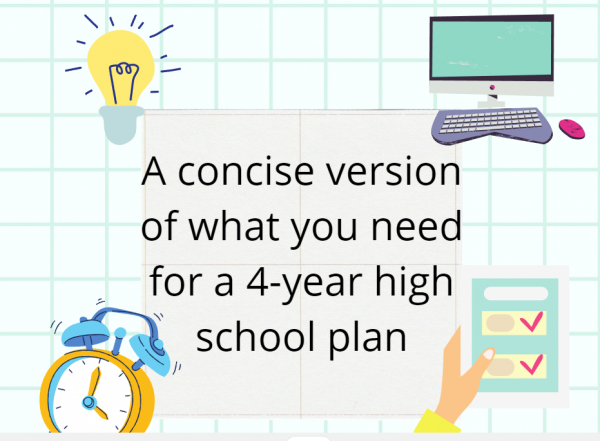4 YEAR HIGH SCHOOL PLAN
What is a 4-year high school plan and why do teens need one? Read below for a concise version of planning your teen’s high school career.

By Wendi Ostroff
What is a 4-year high school plan and why do teens need one?
Starting high school is a big transition. You are getting older; college is just 4 years away and classes become more intense and important.
A lot of “things” compete for your time during high school, and it can be overwhelming at times. Feeling stressed, anxious, and excited are all common emotions that come up with the start of any new school year. This is all normal to experience as you juggle the demands of school and your personal life. Growing up means more independence and it also means more responsibility. That’s alright, you’ve got this!
How a student navigates their time spent in high school affects what they will do in college. While most students do not know what they want to pursue as a career when they are a freshman, this is your chance to try out new classes and electives and start to formulate an idea of your interests. The next 4 years is the time to continue learning about who you are and to showcase yourself with activities and achievements the best you can. This comes with focused, motivated, engaged thinking. To achieve all that, read through this list and save to reread every year.
When beginning school keep these points in mind:
1. What are my strengths and weaknesses, both in and out of the classroom?
• Be realistic about this and consider it a learning process.
2. Do I have a favorite subject or idea of something to learn more about?
• Step out of your comfort zone, check out all the class offerings & try something new. It is fine, and preferable, to have multiple areas.
3. Learn what is required in 4 years to complete high school
• This is mainly about how many years of each subject do you need to graduate as well as qualify for specific colleges (UC for example has more requirements than graduation).
4. Explore different electives
• This could give you an idea of an area you may want to pursue as a career or can stand out on a college application.
5. Ask yourself some questions:
• What kind of student am I? Hard working, a procrastinator, want to excel, care about grades, athletic, a slacker?
• When can I take college level classes or is AP the better path?
• What do I need to know about the SAT/ACT?
6. Get involved in extracurricular activities- this can be sports, clubs, jobs, and volunteer programs.
• Pick an area of interest and give it a try. It can be fun, social and a way to learn more.
7. Think about career options
• Attend a career fair, ask others what they like about their jobs (or don’t like), and do an internship.
8. Maintain a balance- academically and socially. It is important not to take on too much or that will add stress.
• Self-care is important. Eat well, sleep well, exercise, have fun.
8. Learn good study habits and time management skills.
9. Set goals every year and revisit them to be sure you’re on track.
10. Meet your counselor. Print the 4-yr-plan-spreadsheet attached, and fill it in in pencil (so you can make changes)
• Go over your list of classes, ask questions, and take notes.
11. Keep track of all activities and programs you participate in and keep it all in one place.
• Start a file where you collect information about your high school involvement & anything about college.
12. Lastly, but still important, make your summer count.
• Summertime is a great chance to combine vacations, time with friends, and learning opportunities that colleges will notice, like an internship or a class or a study trip.
Each of these can be extrapolated in greater detail, and if there are areas where you would like additional support, reach out and ask for it. Remember to practice positive self-talk; that mistakes happen along the way, and use them to learn and grow; and that tomorrow is always a new day.


